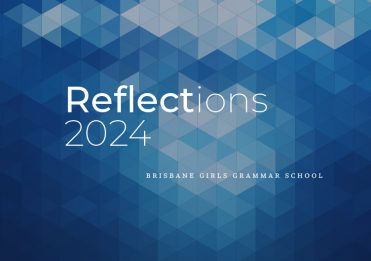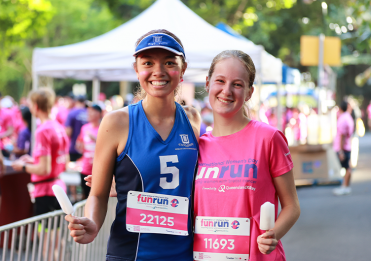This week at Assembly, Dean of Students, Ms Melinda Egan, presented the following Australia Day Address.
Good morning Ms Euler, teachers and students,
I begin by acknowledging the traditional custodians of the land where we are today, the Turrbal and Jagera peoples, and pay my respect to their elders past and present. I extend that respect to Aboriginal and Torres Strait Islander peoples here today.
Exactly one year ago, then Prime Minister Scott Morrison, announced Dylan Alcott as Australian of the Year. Australians were overjoyed to see the award honour a tennis champion, Paralympian, and disability advocate. Whether you’ve heard Dylan broadcast on Triple J, read his book, Able, or heard his sports commentary, I think you would agree that he exudes joy. Not only does his good humour bring a smile to your face, but his spirit of positivity is palpable and bounces from one person to the other. We may see adversity in Dylan’s story, but he sees disability as a gift that has enabled him to advocate for equality, change perception and reduce barriers. How fortunate we are at this time of year to celebrate diverse individuals and be inspired by those who reshape the way we think about ourselves and our country.
Australia Day recognises diverse people and moments from Australian history, and importantly it is a day that challenges us to reflect on the past—both the successes and the wrongs. On Thursday, Australians came together to talk about national identity and recognise what it means to be Australian today. Additionally, it’s a day to stop and ponder the importance of community and the power of sharing our stories and perspectives, just like Dylan Alcott has challenged us to do over the past year.
Australia’s community is becoming more elastic—acknowledging and celebrating diversity in many ways. This leads to a more inclusive and nuanced recognition of what it means to be Australian—and importantly there is an emerging respectful cognisance that Australia Day doesn’t mean the same thing to all people.
‘Who are we?’ is a seemingly simple question, but a difficult one to answer. For all our differences, there is a commonality—that we have a home in Australia. We may come from different places and have lived different lives, but our feeling that ‘this place is home’ is what makes us all Australian. While it would be naïve to think that Australians are a unified collective, there is a spirit of optimism in this country that provides hope about the idea of cohesion—a place where ALL are included and accepted.
Community comes with challenges, and the tension between the collective and the individual can sometimes limit potential. Last year, in Junior Mearle Weaver, Liv Evans (11O), brilliantly explained that collective power can be elusive beyond the experience of the individual. She inspired us to think about the positive impact of collaborative ideas to build the community’s capacity for good. One of the highlights of 2022 was the Nadesalengham family being granted visas to stay longer in Australia after seeking asylum for many years—you may remember them as the family embraced by the Biloela community in Central Queensland. The community rallied and persisted in their support of the family—their grassroots ‘Home to Bilo’ campaign humanised a complex situation.
On Wednesday night, we find out who has been awarded 2023 Australian of the Year. Impressively, the shortlist for the award includes diverse candidates who have made varied contributions—from initiating a formalisation of indigenous sea country rights to promoting ally ship and ‘active multiculturism’—a phrase coined by Craig Foster, one of the candidates, about communities protecting each other.
The stories of these diverse shortlisted candidates will continue the conversation about diversity and inclusion in Australia today. At Girls Grammar, we understand the importance of a safe and inclusive environment where every student is valued and respected. We are proud to be a community that embraces diversity and encourages the sharing of different perspectives and stories.
The South Australian shortlist candidate for Australian of the Year, Taryn Brumfitt, will be connecting with Girls Grammar this term. Taryn is an author and director with a focus on body positivity and embracing diversity in all its ways. Her film ‘Embrace Kids’ features a collection of stories from young people speaking about embracing their identity. The film advocates for a collective understanding about the richness of diversity—in gender, cultural background, ability, appearance—and an acceptance of the things that make us unique. Challenging stereotypes, the film has a strong call to action for young people in Australia to think differently. That is, we don’t need to fit into the Aussie stereotype—as Eve McGrath (9E) so poetically sang about on Assembly last year—‘I don’t need to fit in, I’m already an Aussie Kid’. As Eve beautifully demonstrated, our words (or lyrics in this case) have influence and spark meaningful dialogue in the community.
There is a certain gentleness required in embracing diversity—not everyone has the same experiences, heard or read the same stories, had the same challenges or successes. There is a certain charity required—when in conflict or a clash of perspectives —we can assume the best version of what someone is saying and assume they have good intentions. There is a certain kindness required—we can lessen the layer of judgement that proceeds when we meet someone.
To conclude, we can continue to shape our identity by telling and hearing diverse stories. It’s a powerful tool for reconciliation and creating an inclusive community. Determined to spread his positivity, Dylan Alcott says to young people to ‘Be proud of who you are’ and encourages us ALL by saying ‘It’s up to all of us in society to create a space where others are included’. I hope that Australia Day provides you with a wealth of stories that not only provide moments of reflection but also inspiration.




